选择性必修 二 Unit 1 Science and Scientists - Learning about language(47张PPT)
文档属性
| 名称 | 选择性必修 二 Unit 1 Science and Scientists - Learning about language(47张PPT) | 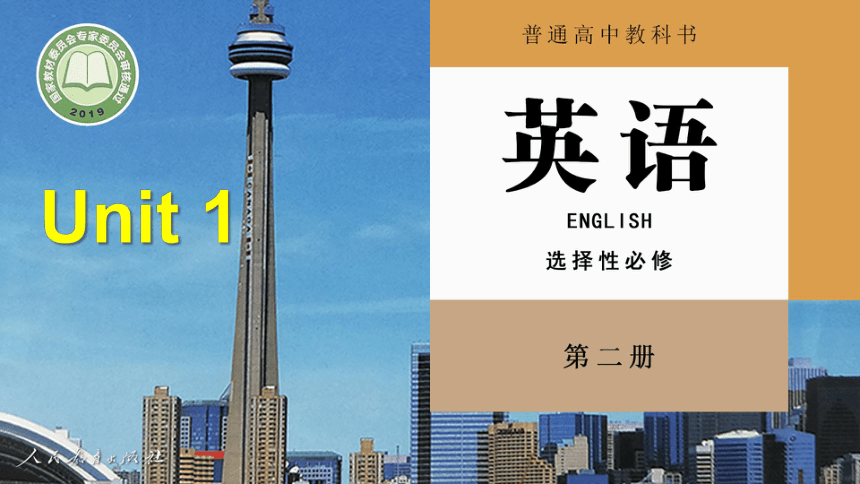 | |
| 格式 | pptx | ||
| 文件大小 | 4.6MB | ||
| 资源类型 | 试卷 | ||
| 版本资源 | 人教版(2019) | ||
| 科目 | 英语 | ||
| 更新时间 | 2022-01-27 15:11:50 | ||
图片预览

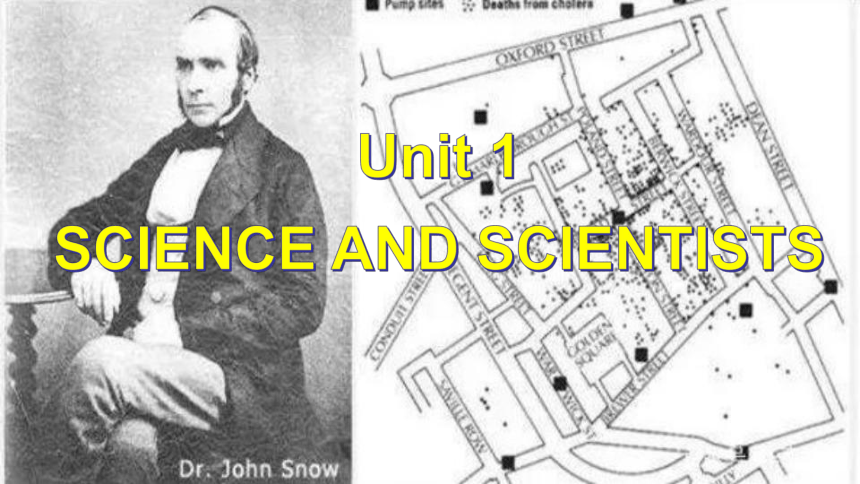
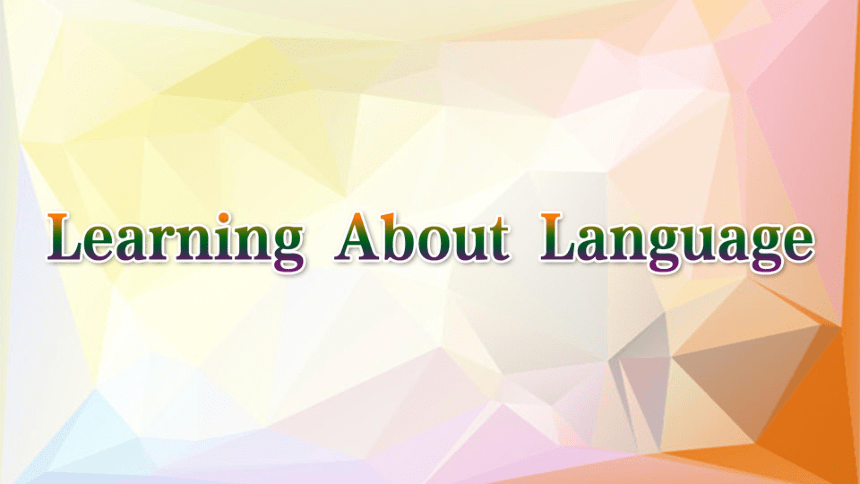
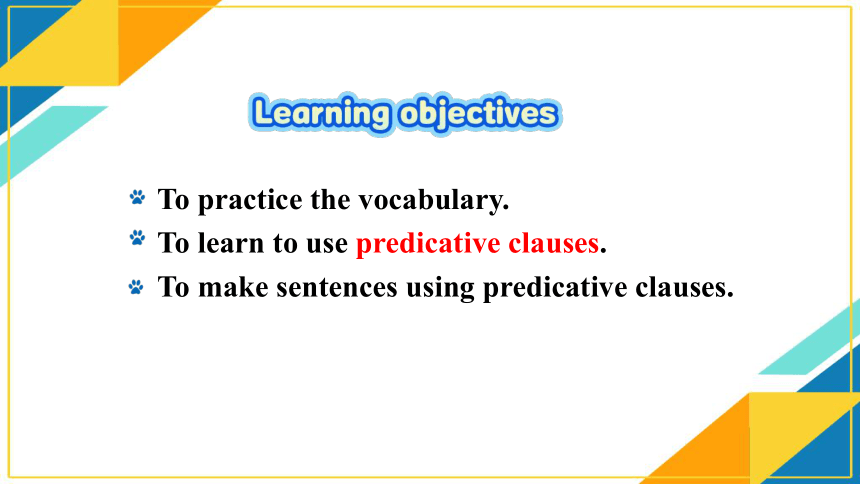
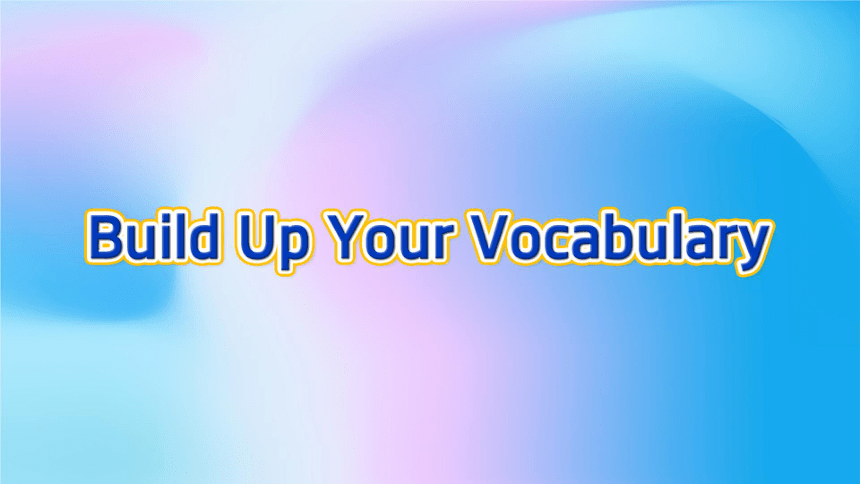
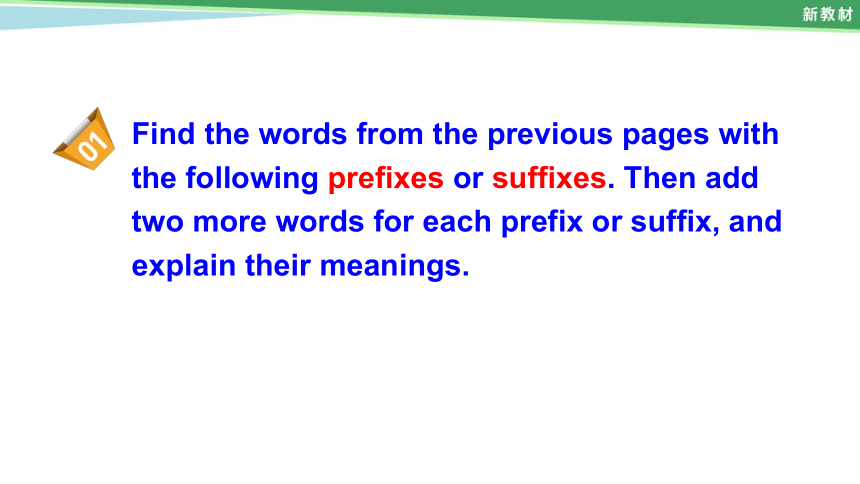
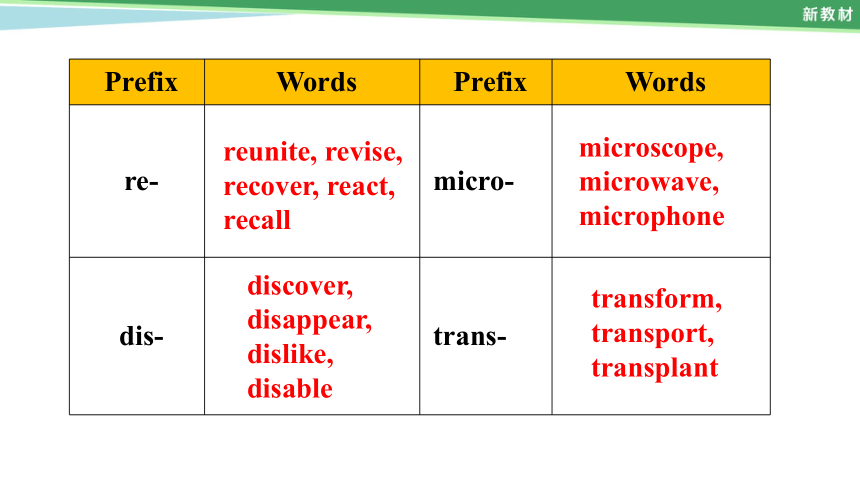
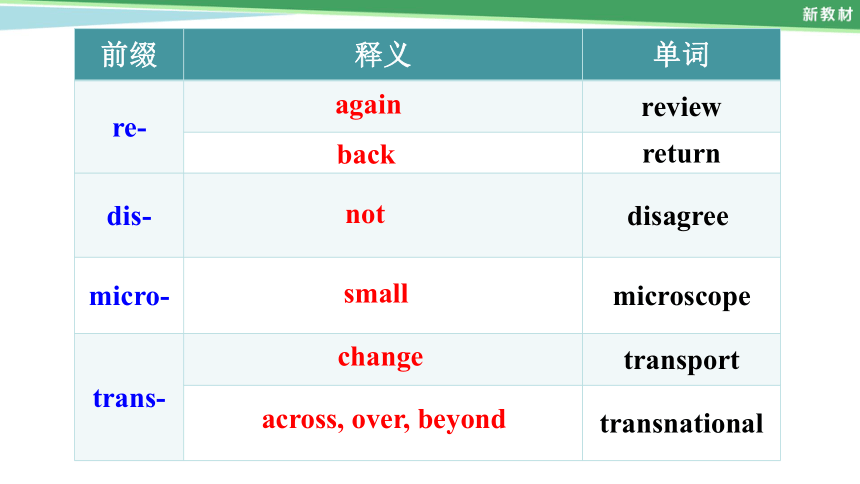
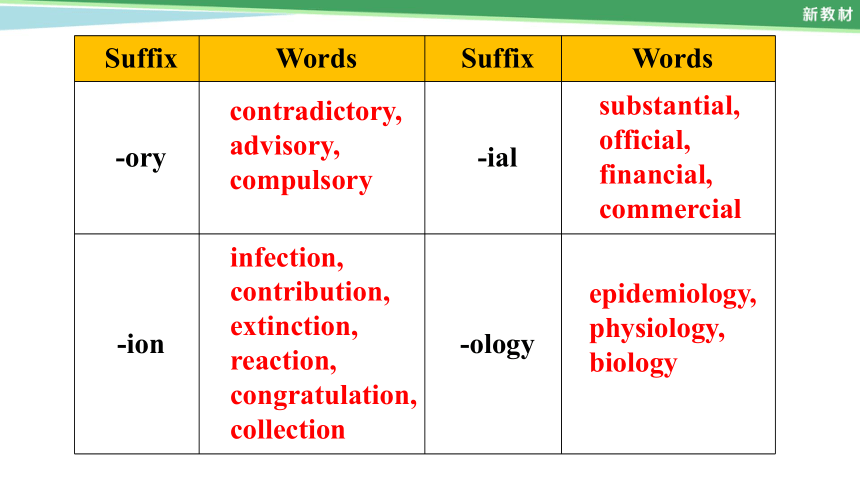
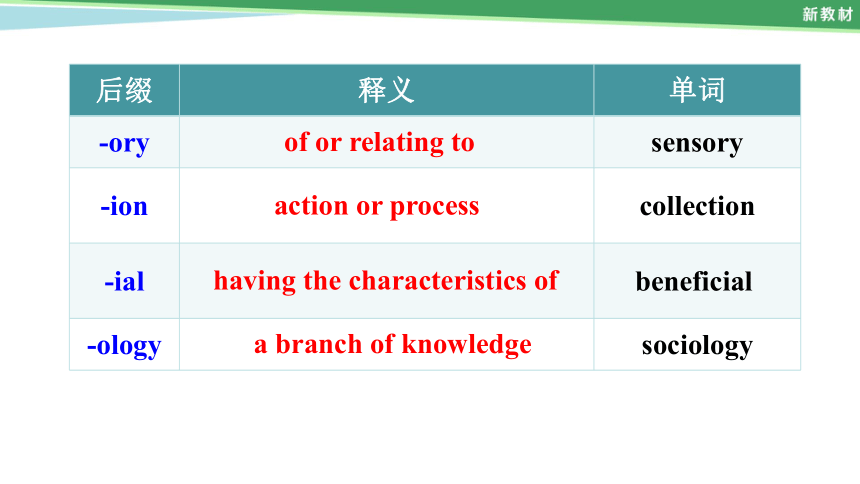
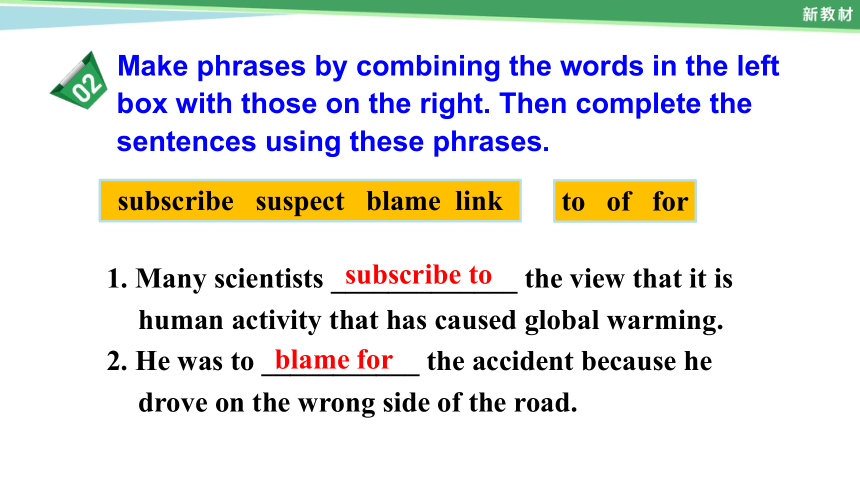
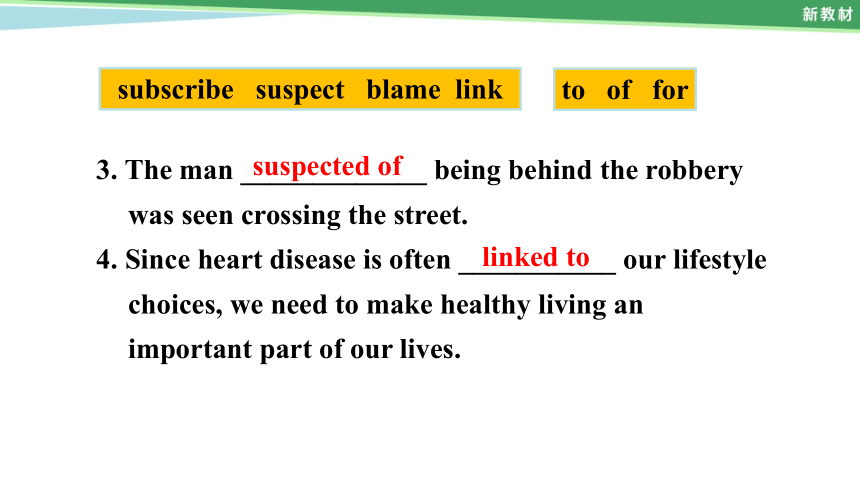
文档简介
(共47张PPT)
Unit 1
Unit 1
SCIENCE AND SCIENTISTS
To practice the vocabulary.
To learn to use predicative clauses.
To make sentences using predicative clauses.
Find the words from the previous pages with the following prefixes or suffixes. Then add two more words for each prefix or suffix, and explain their meanings.
Prefix Words Prefix Words
re- micro-
dis- trans-
reunite, revise, recover, react, recall
discover, disappear, dislike, disable
microscope,
microwave,
microphone
transform, transport, transplant
前缀 释义 单词
re- review
return
dis- disagree
micro- microscope
trans- transport
transnational
again
back
not
small
change
across, over, beyond
Suffix Words Suffix Words
-ory -ial
-ion -ology
contradictory, advisory,
compulsory
infection, contribution, extinction, reaction, congratulation, collection
substantial, official, financial, commercial
epidemiology, physiology, biology
后缀 释义 单词
-ory sensory
-ion collection
-ial beneficial
-ology sociology
of or relating to
action or process
having the characteristics of
a branch of knowledge
Make phrases by combining the words in the left box with those on the right. Then complete the sentences using these phrases.
1. Many scientists _____________ the view that it is human activity that has caused global warming.
2. He was to ___________ the accident because he drove on the wrong side of the road.
subscribe suspect blame link
subscribe to
blame for
to of for
3. The man _____________ being behind the robbery was seen crossing the street.
4. Since heart disease is often ___________ our lifestyle choices, we need to make healthy living an important part of our lives.
suspected of
linked to
subscribe suspect blame link
to of for
It is not unusual for an athlete to be well known while he is active, and quickly forgotten when his athletic career is over.
2. I'm sure she'll deal with the changes very well because she's very adaptable.
Replace the underlined parts with suitable words from the box.
a household name
handle
raw, a household name, substantial, statistics, handle
3. He was ready to serve dinner to his friends when he realised that he had forgotten to turn on the oven and the meat was not cooked yet.
4. He used his great influence to change the thinking of the scientific community on this issue.
5. Scientists have collected more data than expected to prove the theory.
raw
substantial
statistics
raw, a household name, substantial, statistics, handle
UK scientists believe they may have found a way to fight the common cold. It blocks a key protein in the body's cells that is to _______ for the spread of cold-causing virus.
Read this passage about medical plete it using the words below.
blame
infection, multiple, decrease, severe,
transform, proof, blame, substantial
Targeting the host rather than the _________ was a bit non-traditional but made sense because it was tricky to target the virus. Cold-causing virus are not only of _________ kinds, they also ___________ rapidly, meaning they can quickly develop resistance to medicine. Researchers are working on making a form
infection
multiple
transform
infection, multiple, decrease, severe,
transform, proof, blame, substantial
of medicine that can be taken directly into one's lungs, to _________ the chance of side effects. Though these scientists have made __________ advances in their research, further _______ is needed to make sure such drugs are not so _________ that they harm the body.
decrease
substantial
proof
severe
infection, multiple, decrease, severe,
transform, proof, blame, substantial
The truth was that the water from the Broad Street pump had been infected by waste.
Discovery
predicative clause
Underline all the examples in the reading passage where noun clauses are used as the predicative. Then state their meaning and functions.
One theory was that bad air caused the disease.
Another was that cholera was caused by an infection from germs in food or water.
It seemed that the woman liked the water from the pump so much that she had it delivered to her house every day.
The truth was that the water from the Broad Street pump had been infected by waste.
在复合句中作表语的从句叫做表语从句。位于主句的系动词之后,对主语进行解释、说明,使主语的内容具体化。表语从句必须用陈述语序。
e.g. The question is who broke the vase.
My suggestion is that we (should) start early tomorrow.
Predicative Clauses
( 表语从句)
连系动词
状态类: be动词, seem, appear, keep, remain, stay…
变化类: become, get, turn, grow, fall, come, go …
感官类: look, smell, taste, sound, feel …
表语从句的引导词
连接词 连词 在从句中不作成分 that, whether, as if, as though, because …
连接代词 在从句中作主语、宾语、表语、定语 what, who, whom, whose, which, whatever, whoever, whichever …
连接副词 在从句中作状语 when, where, how, why …
e.g.
The trouble is that I have lost his address.
The question is whether they will go by plane or by train.
It sounds as if / though someone is knocking at the door.
This is because the weather here is cold and wet.
That's why Tony got angry with me.
He has become what he wanted to be ten years ago.
The question is how we can find the suitable man for the
job.
表语从句要点归纳
1. 表语从句一定要用陈述语序。
e.g. One advantage of playing the guitar is that it can give you a great deal of pleasure.
2. that引导表语从句时, 在句中只起连接作用, 不充当句子成分, 无实际意义, 一般不能省略。
e.g. The trouble is that I have lost his address.
3. whether引导表语从句时,起连接作用,意为“是否,空间,到底”,在句中不作任何成分。
if不能引导表语从句。
e.g. The question is whether your uncle will offer help to us.
4. 连接代词ho, whom, whose, what, which, whoever, whatever, whichever等除在句中起连接作用外,在从句中还充当主语、宾语、表语或定语,本身具有词义。
e.g. My hometown is no longer what it used to be.
The problem is who we can get to replace her.
5. 连接副词where, when, why, how等除在句中起连接作用,在从句中还充当地点、时间、原因、方式状语,本身具有词义。
e.g. The question is when they will start the project.
The question is how he did it.
6. That is because ... 指原因或理由;
That is why ... 则指由于某种原因所造成的后果。
e.g. Bruce did not watch the game last night. That was because he had to help his little sister with her homework.
Bob had seen the film before. That was why he did not see it yesterday.
7. 需使用虚拟语气的表语从句
在advice, suggestion, order, proposal等表示建议、劝告、命令等含义的名词后的表语从句中,谓语动词需用“should +动词原形”,should可省略。
e.g. My suggestion is that we (should) start early tomorrow.
Answer the following questions using the information from the reading passage as well as the predicative clauses.
What was it that John Snow showed to the world
→What John Snow showed to the world was how cholera could be overcome.
1. What was Snow's discovery in two particular streets in London
Snow's discovery in two particular streets in London was that ______________________________________
__________________________________.
2. What was Snow determined to find out during the 1854 outbreak of cholera in London
What Snow was determined to find out was why __________________________________________________________________.
the cholera outbreak was so severe that
the cholera outbreak had caused over 500 deaths
more than 500 people died in ten days
within ten days
3. What were the exact places Snow marked on the map
The exact places Snow marked on the map were where _________________________.
4. What was the finding that Snow announced
Snow's finding was that ________________________
__________________.
all those who died had lived
the pump water carried
cholera germs
David is talking to Maria about their scientific research project. First complete David’s lines (A-E), using the words in the box. Then put David’s lines in the correct order and practise the conversation.
as if, that, what, who, when,
how, why, whose, which, whether
A. Absolutely. You may not believe it, but that was ________ happened at the initial stage of our group's research on developing a vaccine for malaria.
B. Yes, it is. And it seemed _______ all the theories were useful, but the fact was _____ we couldn't persuade one another that one theory was better than another.
what
as if
that
as if, that, what, who, when,
how, why, whose, which, whether
C. Exactly. The problem was not about ________ all our theories were equally good, but in deciding _______ theory to depend upon.
D. We realised that what we cared about was not _______ aspect we needed to develop a theory in, but rather ______ we can reduce the cost of a vaccine without reducing its effect!
E. You're right. At last, we became focused on the key issue, which was ______ we had to carry out the research in the first place.
whose
which
how
as if, that, what, who, when,
how, why, whose, which, whether
why
whether
Maria: This mix of theory and data is one of the key characteristics of what we call science.
David:
Maria: With your theoretical framework
David:
Maria: Deciding on a theory is definitely of critical importance.
A. Absolutely. You may not believe it, but that was what happened at the initial stage of our group's research on developing a vaccine for malaria.
C. Exactly. The problem was not about whether all our theories were equally good, but in deciding whose theory to depend upon.
David:
Maria: This was when you should have calmed down and got down to doing some solid work.
David:
B. Yes, it is. And it seemed as if all the theories were useful, but the fact was that we couldn't persuade one another that one theory was better than another.
E. You're right. At last, we became focused on the key issue, which was why we had to carry out the research in the first place.
Maria: So what happened in the end
David:
D. We realised that what we cared about was not which aspect we needed to develop a theory in, but rather how we can reduce the cost of a vaccine without reducing its effect!
用合适的连接词补全下面的对话。
Tom: Hi, Jane. I want to become a scientist. My question is ________ scientists work and what I need to do in order to become a scientist. First of all, I'd like to know how long I have to study to become a scientist.
how
Jane: Well, that depends. Usually, a scientist must have at least a Bachelor's degree, so that means about four years in college. Nowadays, most scientists need a Master's degree, too.
Tom: My second question is ________ courses or major should I choose.
what
Jane: Again, that depends on what you want to study in the future. You will need to study maths. If you want to be a successful scientist, you must understand the basics of physics, chemistry and biology.
Tom: Wow, that's a lot. What puzzled me was ________ branch of science I should choose
which
Jane: Well, I think the best way is ______ you should get some practical experience. Visit scientists and laboratories to see what the life of a scientist is like. Ask scientists to tell you about their work. You should also try to find out which branch of science you like and are good at.
Tom: I like physics, but the question is _________ my parents will allow me to major in it.
that
whether
Jane: That's unbelievable. My first advice is ________ you should make your own decision.
Tom: I think so. Do you have any other advice for me
Jane: Yes. I think a good scientist should be careful, curious and creative and that he or she should like to ask a lot of questions and solve problems.
that
Review the words, expressions and sentences we have learned.
Review Grammar.
3. Finish the exercises in the workbook.
Unit 1
Unit 1
SCIENCE AND SCIENTISTS
To practice the vocabulary.
To learn to use predicative clauses.
To make sentences using predicative clauses.
Find the words from the previous pages with the following prefixes or suffixes. Then add two more words for each prefix or suffix, and explain their meanings.
Prefix Words Prefix Words
re- micro-
dis- trans-
reunite, revise, recover, react, recall
discover, disappear, dislike, disable
microscope,
microwave,
microphone
transform, transport, transplant
前缀 释义 单词
re- review
return
dis- disagree
micro- microscope
trans- transport
transnational
again
back
not
small
change
across, over, beyond
Suffix Words Suffix Words
-ory -ial
-ion -ology
contradictory, advisory,
compulsory
infection, contribution, extinction, reaction, congratulation, collection
substantial, official, financial, commercial
epidemiology, physiology, biology
后缀 释义 单词
-ory sensory
-ion collection
-ial beneficial
-ology sociology
of or relating to
action or process
having the characteristics of
a branch of knowledge
Make phrases by combining the words in the left box with those on the right. Then complete the sentences using these phrases.
1. Many scientists _____________ the view that it is human activity that has caused global warming.
2. He was to ___________ the accident because he drove on the wrong side of the road.
subscribe suspect blame link
subscribe to
blame for
to of for
3. The man _____________ being behind the robbery was seen crossing the street.
4. Since heart disease is often ___________ our lifestyle choices, we need to make healthy living an important part of our lives.
suspected of
linked to
subscribe suspect blame link
to of for
It is not unusual for an athlete to be well known while he is active, and quickly forgotten when his athletic career is over.
2. I'm sure she'll deal with the changes very well because she's very adaptable.
Replace the underlined parts with suitable words from the box.
a household name
handle
raw, a household name, substantial, statistics, handle
3. He was ready to serve dinner to his friends when he realised that he had forgotten to turn on the oven and the meat was not cooked yet.
4. He used his great influence to change the thinking of the scientific community on this issue.
5. Scientists have collected more data than expected to prove the theory.
raw
substantial
statistics
raw, a household name, substantial, statistics, handle
UK scientists believe they may have found a way to fight the common cold. It blocks a key protein in the body's cells that is to _______ for the spread of cold-causing virus.
Read this passage about medical plete it using the words below.
blame
infection, multiple, decrease, severe,
transform, proof, blame, substantial
Targeting the host rather than the _________ was a bit non-traditional but made sense because it was tricky to target the virus. Cold-causing virus are not only of _________ kinds, they also ___________ rapidly, meaning they can quickly develop resistance to medicine. Researchers are working on making a form
infection
multiple
transform
infection, multiple, decrease, severe,
transform, proof, blame, substantial
of medicine that can be taken directly into one's lungs, to _________ the chance of side effects. Though these scientists have made __________ advances in their research, further _______ is needed to make sure such drugs are not so _________ that they harm the body.
decrease
substantial
proof
severe
infection, multiple, decrease, severe,
transform, proof, blame, substantial
The truth was that the water from the Broad Street pump had been infected by waste.
Discovery
predicative clause
Underline all the examples in the reading passage where noun clauses are used as the predicative. Then state their meaning and functions.
One theory was that bad air caused the disease.
Another was that cholera was caused by an infection from germs in food or water.
It seemed that the woman liked the water from the pump so much that she had it delivered to her house every day.
The truth was that the water from the Broad Street pump had been infected by waste.
在复合句中作表语的从句叫做表语从句。位于主句的系动词之后,对主语进行解释、说明,使主语的内容具体化。表语从句必须用陈述语序。
e.g. The question is who broke the vase.
My suggestion is that we (should) start early tomorrow.
Predicative Clauses
( 表语从句)
连系动词
状态类: be动词, seem, appear, keep, remain, stay…
变化类: become, get, turn, grow, fall, come, go …
感官类: look, smell, taste, sound, feel …
表语从句的引导词
连接词 连词 在从句中不作成分 that, whether, as if, as though, because …
连接代词 在从句中作主语、宾语、表语、定语 what, who, whom, whose, which, whatever, whoever, whichever …
连接副词 在从句中作状语 when, where, how, why …
e.g.
The trouble is that I have lost his address.
The question is whether they will go by plane or by train.
It sounds as if / though someone is knocking at the door.
This is because the weather here is cold and wet.
That's why Tony got angry with me.
He has become what he wanted to be ten years ago.
The question is how we can find the suitable man for the
job.
表语从句要点归纳
1. 表语从句一定要用陈述语序。
e.g. One advantage of playing the guitar is that it can give you a great deal of pleasure.
2. that引导表语从句时, 在句中只起连接作用, 不充当句子成分, 无实际意义, 一般不能省略。
e.g. The trouble is that I have lost his address.
3. whether引导表语从句时,起连接作用,意为“是否,空间,到底”,在句中不作任何成分。
if不能引导表语从句。
e.g. The question is whether your uncle will offer help to us.
4. 连接代词ho, whom, whose, what, which, whoever, whatever, whichever等除在句中起连接作用外,在从句中还充当主语、宾语、表语或定语,本身具有词义。
e.g. My hometown is no longer what it used to be.
The problem is who we can get to replace her.
5. 连接副词where, when, why, how等除在句中起连接作用,在从句中还充当地点、时间、原因、方式状语,本身具有词义。
e.g. The question is when they will start the project.
The question is how he did it.
6. That is because ... 指原因或理由;
That is why ... 则指由于某种原因所造成的后果。
e.g. Bruce did not watch the game last night. That was because he had to help his little sister with her homework.
Bob had seen the film before. That was why he did not see it yesterday.
7. 需使用虚拟语气的表语从句
在advice, suggestion, order, proposal等表示建议、劝告、命令等含义的名词后的表语从句中,谓语动词需用“should +动词原形”,should可省略。
e.g. My suggestion is that we (should) start early tomorrow.
Answer the following questions using the information from the reading passage as well as the predicative clauses.
What was it that John Snow showed to the world
→What John Snow showed to the world was how cholera could be overcome.
1. What was Snow's discovery in two particular streets in London
Snow's discovery in two particular streets in London was that ______________________________________
__________________________________.
2. What was Snow determined to find out during the 1854 outbreak of cholera in London
What Snow was determined to find out was why __________________________________________________________________.
the cholera outbreak was so severe that
the cholera outbreak had caused over 500 deaths
more than 500 people died in ten days
within ten days
3. What were the exact places Snow marked on the map
The exact places Snow marked on the map were where _________________________.
4. What was the finding that Snow announced
Snow's finding was that ________________________
__________________.
all those who died had lived
the pump water carried
cholera germs
David is talking to Maria about their scientific research project. First complete David’s lines (A-E), using the words in the box. Then put David’s lines in the correct order and practise the conversation.
as if, that, what, who, when,
how, why, whose, which, whether
A. Absolutely. You may not believe it, but that was ________ happened at the initial stage of our group's research on developing a vaccine for malaria.
B. Yes, it is. And it seemed _______ all the theories were useful, but the fact was _____ we couldn't persuade one another that one theory was better than another.
what
as if
that
as if, that, what, who, when,
how, why, whose, which, whether
C. Exactly. The problem was not about ________ all our theories were equally good, but in deciding _______ theory to depend upon.
D. We realised that what we cared about was not _______ aspect we needed to develop a theory in, but rather ______ we can reduce the cost of a vaccine without reducing its effect!
E. You're right. At last, we became focused on the key issue, which was ______ we had to carry out the research in the first place.
whose
which
how
as if, that, what, who, when,
how, why, whose, which, whether
why
whether
Maria: This mix of theory and data is one of the key characteristics of what we call science.
David:
Maria: With your theoretical framework
David:
Maria: Deciding on a theory is definitely of critical importance.
A. Absolutely. You may not believe it, but that was what happened at the initial stage of our group's research on developing a vaccine for malaria.
C. Exactly. The problem was not about whether all our theories were equally good, but in deciding whose theory to depend upon.
David:
Maria: This was when you should have calmed down and got down to doing some solid work.
David:
B. Yes, it is. And it seemed as if all the theories were useful, but the fact was that we couldn't persuade one another that one theory was better than another.
E. You're right. At last, we became focused on the key issue, which was why we had to carry out the research in the first place.
Maria: So what happened in the end
David:
D. We realised that what we cared about was not which aspect we needed to develop a theory in, but rather how we can reduce the cost of a vaccine without reducing its effect!
用合适的连接词补全下面的对话。
Tom: Hi, Jane. I want to become a scientist. My question is ________ scientists work and what I need to do in order to become a scientist. First of all, I'd like to know how long I have to study to become a scientist.
how
Jane: Well, that depends. Usually, a scientist must have at least a Bachelor's degree, so that means about four years in college. Nowadays, most scientists need a Master's degree, too.
Tom: My second question is ________ courses or major should I choose.
what
Jane: Again, that depends on what you want to study in the future. You will need to study maths. If you want to be a successful scientist, you must understand the basics of physics, chemistry and biology.
Tom: Wow, that's a lot. What puzzled me was ________ branch of science I should choose
which
Jane: Well, I think the best way is ______ you should get some practical experience. Visit scientists and laboratories to see what the life of a scientist is like. Ask scientists to tell you about their work. You should also try to find out which branch of science you like and are good at.
Tom: I like physics, but the question is _________ my parents will allow me to major in it.
that
whether
Jane: That's unbelievable. My first advice is ________ you should make your own decision.
Tom: I think so. Do you have any other advice for me
Jane: Yes. I think a good scientist should be careful, curious and creative and that he or she should like to ask a lot of questions and solve problems.
that
Review the words, expressions and sentences we have learned.
Review Grammar.
3. Finish the exercises in the workbook.
